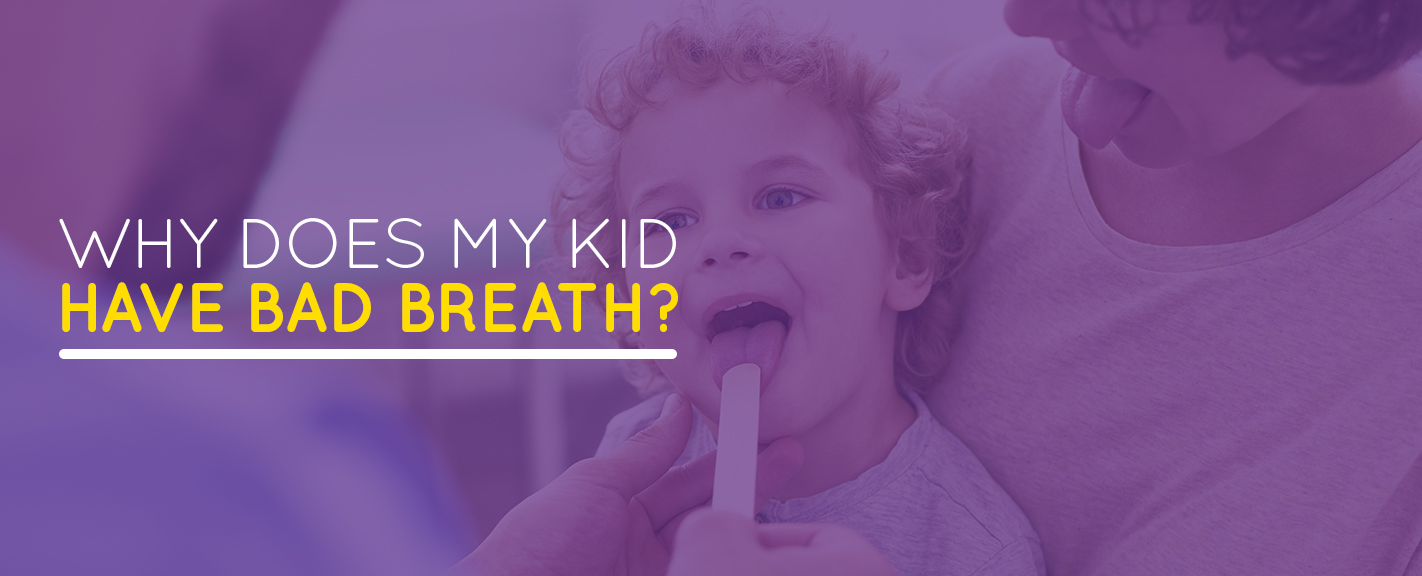We’ve all been there. Someone leans over to say something, and we catch a whiff of something a little, ahem, unpleasant. Halitosis — commonly known as bad breath — is a pretty common occurrence for adults. One out of every four people struggles with bad breath. But a lot of people don’t realize bad breath isn’t only an adult problem.
Halitosis is a common problem for kids, too.
Call to Schedule A Dental Appointment
Halitosis or bad breath in kids doesn’t have to be a big deal, but sometimes we make it into one. Yes, it can be embarrassing, but when it comes to helping kids address this treatable problem, it’s best for adults to overcome their embarrassment and teach their kids how to overcome it.
If you help your child address bad breath while they’re young, you’ll teach them how to treat — and even prevent — it later.
Halitosis: Why Do Kids Have Bad Breath?
The simple definition of halitosis is bad breath. The term comes from the Latin word halitus, which means “breath.” It’s a frequent problem that can be particularly challenging for kids. Not only can it be a sign of an underlying health problem — or a problem with oral hygiene — but it can also quickly become a social issue for kids.
Just like adults have trouble hanging around someone with stinky breath, kids can also struggle with that. And, since kids don’t always have the refined social filters adults have developed, they may be more likely to make unkind comments or say things that will hurt your child’s feelings.
Sometimes parents feel uncomfortable bringing the topic of halitosis up with their child because they don’t want to sound critical or mean. The truth is that addressing oral hygiene with your child in a kind, thoughtful manner is a loving thing to do.
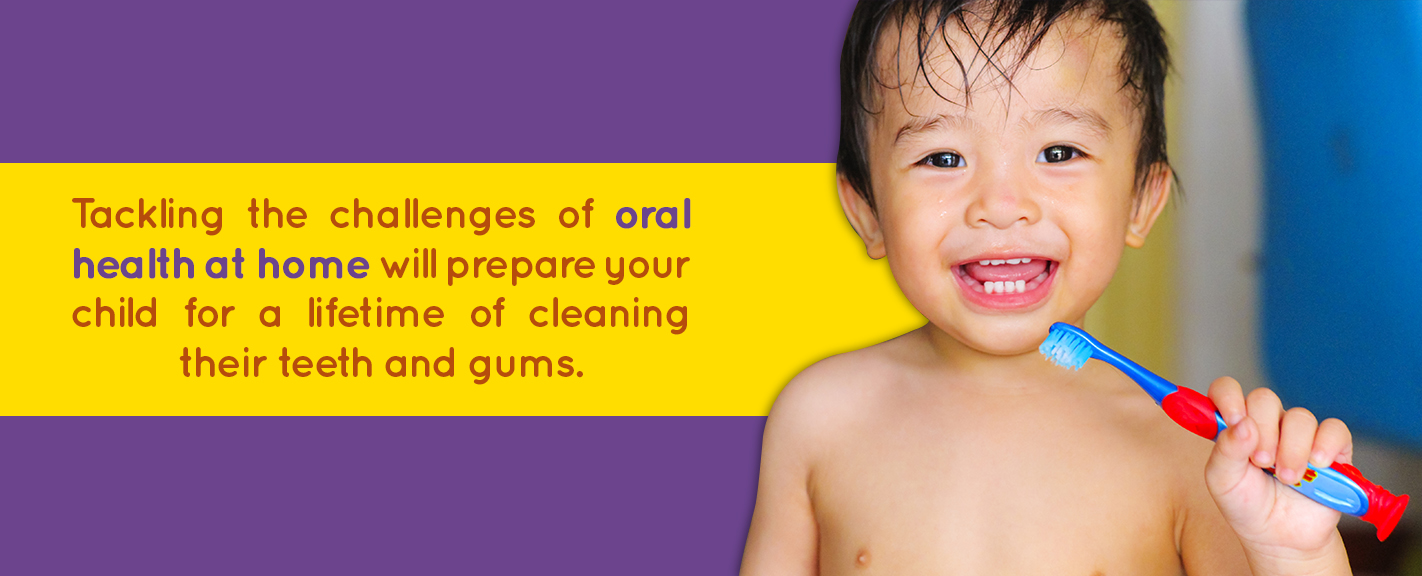
By talking about bad breath at home, you can save your child from the embarrassment of a classmate bringing it up at school. Not only that, but the leading cause of halitosis is poor oral hygiene. When kids have bad breath, there’s a good chance things aren’t all that clean in their mouth. Tackling the challenges of oral health at home will prepare your child for a lifetime of cleaning their teeth and gums. The harder you work with your child to help them develop this habit now, the less they will struggle later.
We promise.
See a Portland Pediatric Dentist
Does Halitosis Cause Bad Breath in Kids?
We often attribute halitosis to poor brushing skills or love of onions, but detecting the causes of bad breath isn’t always that simple. It can stem from one of several sources — or even a combination of them. Later, we’ll talk about ways kids can treat and overcome bad breath, but for now, let’s start by taking a look at the reasons kids have bad breath in the first place.
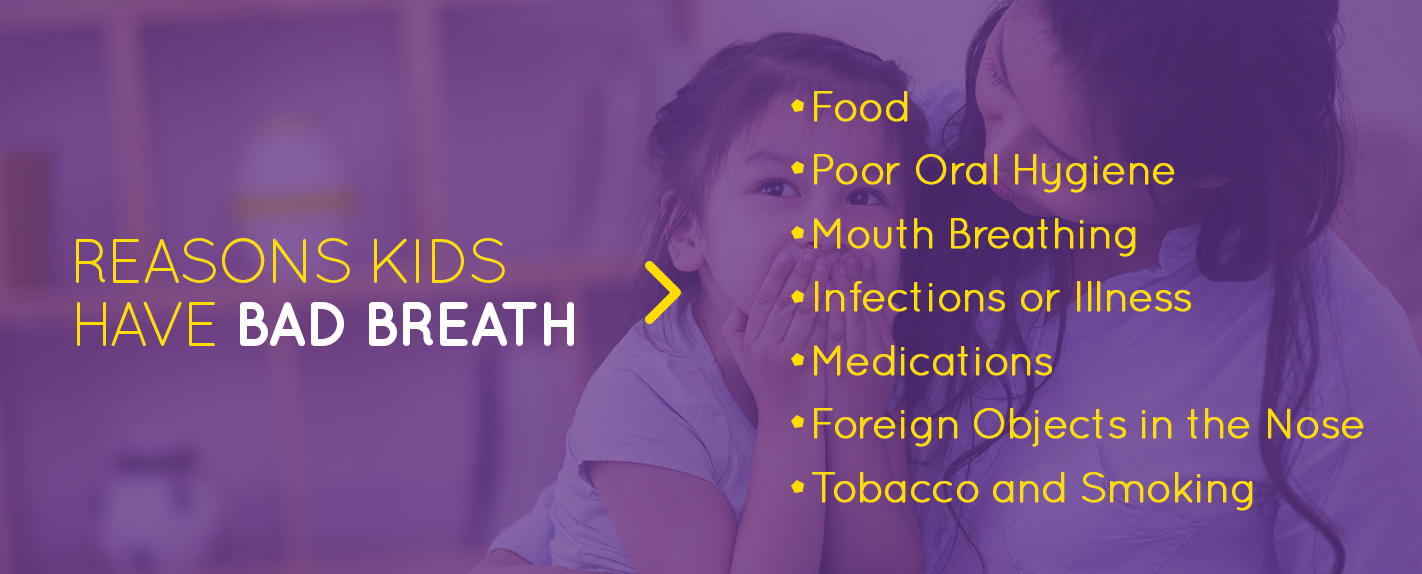
1. Food
Let’s get the most obvious reason out of the way first. If a child is regularly consuming foods with strong odors — garlic, onions and certain strong spices — their breath may reflect their meal choices. Easing up on these pungent seasonings can be one way to quickly resolve this problem.
There is also a link between bad breath and higher consumption of junk food, such as potato chips, sticky candy and chocolate — anything that can become trapped between your teeth. Now, you have yet another reason to go easy on the junk foods and encourage healthy eating with your kids.
2. Poor Oral Hygiene
Poor oral hygiene in kids and adults alike is the most common reason for bad breath. The good news is that it’s also the most straightforward issue to resolve. Children especially are notorious for being poor brushers because they are in a hurry and don’t understand the technique behind brushing their teeth. When they don’t brush properly, food particles get stuck in teeth and plaque builds up inside their mouth. Bacteria begin to grow and a foul odor develops.
Over time, a buildup of plaque and bacteria in your child’s mouth can lead to cavities, tooth decay and, in serious cases, gum disease. All these oral conditions can result in bad breath. Developing consistent and thorough oral hygiene for kids — which we’ll talk about later — is the best way to ensure kids have fresh, clean breath.
3. Mouth Breathing
There is an undeniable connection between mouth breathing and bad breath. When a child breathes through their mouth — especially while they sleep — it prevents them from generating saliva to wash away unwanted bacteria. As the bacteria make themselves at home in their mouth, the odors build. Sometimes this might happen because a child has a stuffy nose from a cold. Once the cold goes away, they will resume breathing through their nose, and their saliva can do its job. When this happens, their bad breath will most likely resolve itself.
If your child has chronic sinus issues or regularly sleeps with their mouth open for some other reason, the smell may continue. While there are certain things you can do at home to minimize the odors associated with a dry mouth, you’ll want to consult with your child’s dentist or pediatrician if the problem continues, since it may signal another issue.
4. Infections or Illness
Conditions like mouth sores, infections, cavities or recent oral surgery can also result in halitosis. Cavities cause bad breath because of the bacteria associated with tooth decay. Tonsilitis, sinus infections or any sinus-related issue can also contribute to this problem. Sinus infections especially can lead to a buildup of fluid in the throat and nasal passages that can become very stinky. If your child has had a recent illness or infection, an infection could be the culprit. Or, if they are displaying other signs of sickness, such as a sore throat, congestion, etc., that may be a sign their bad breath is unrelated to their oral hygiene.
When a child is suffering from tonsilitis, bacteria can build up in the pits of the tonsils because they are swollen. The infection itself can cause bad breath, but the buildup of bacteria around the swollen tonsils can make it even worse. If you suspect your child’s tonsils are infected, use a flashlight to inspect the back of their throat. You don’t have to be a doctor to identify red, swollen tonsils. And, sometimes they’ll have white spots on them too.
5. Medications
Sometimes, the way our bodies break down medications can result in bad breath. Other times, certain medicines — such as antihistamines — can cause dry mouth and bad breath. If your child is taking a medication that can cause dry mouth, or their bad breath began after they started taking the medication, there could be a connection.
5. Foreign Objects in the Nose
Yes, it sounds weird, but young children have been known to place beads, Legos, food or other small objects up their noses out of curiosity. If these objects get lodged up there — especially if you didn’t detect them right away — they can cause bad breath. If you suspect your child may have something stuck in their nose, immediately get them to a doctor who can evaluate them and help you remove the object safely.
6. Tobacco and Smoking
This one can become a concern as your kids become teenagers and start to experiment with things they shouldn’t. Smoking or using tobacco products can give you bad breath. These products can also lead to gum decay, which causes bad breath. If your teenager starts the nasty habit now, their bad breath may become a bigger issue as they age. Teach your kids to stay away from these products, no matter what their friends are doing.
What’s Normal, What’s a Warning Sign
Everyone has bad breath once in a while. There’s no reason for alarm if your child’s breath smells particularly unpleasant occasionally. Whether you admit it or not, yours doesn’t always smell great either. Most of the time, improving your child’s oral hygiene is all you’ll need to quietly and calmly correct the problem.
If you’ve worked with your child on proper brushing and adjusted their diet to remove particularly stinky foods, a persistent odor may signal a bigger problem. Ongoing odors, as well as other symptoms, such as pain or symptoms of infection, may signal an underlying issue that isn’t related to their oral hygiene. Addressing these problems with your child’s pediatrician or dentist and getting the correct diagnosis and treatment of halitosis in kids is the best way to get to the root of the problem in a loving, compassionate way.
As parents, it’s important to spend time observing our kids. Watch what they eat and drink, know what they’re up to when they hang out with friends, talk to them about how they’re feeling. All this information can help you identify the source of a problem — even one that seems as simple as bad breath — before it gets out of hand.
How to Treat Bad Breath
Yes, it’s crucial to address ongoing issues for kids with bad breath. But it’s never something you should use to make your child feel bad about themselves. In most cases, it’s not a huge deal, and it’s completely treatable. So, what’s the best way to go about this?
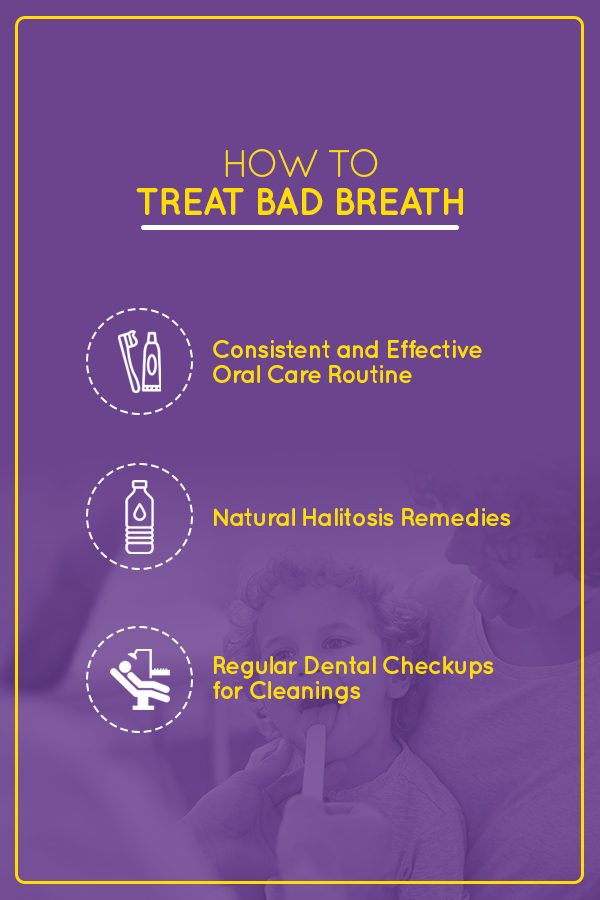
First, take a deep breath and lovingly talk to your child about what you’ve noticed. In many cases, they may have spotted it first. But, if you’re the one who has to bring it up, tell them what you’re concerned about and give them a plan for how to address it.
If you’ve ruled out an underlying medical condition, such as a sinus infection or foreign object in the nose, there are several things you can do at home to treat the problem.
1. Consistent and Effective Oral Care Routine
We’ve said it before, but it bears repeating: The best way to prevent bad breath is to brush regularly — and thoroughly! If you aren’t sure what your child’s brushing routine should look like, follow these guidelines for successful brushing.
- Develop a routine: Brush after breakfast and before bedtime, every day.
- Brush for two minutes each time: To give your child a sense of timing, find a song or video online that lasts for two minutes and play it while your child brushes. There are even several brushing videos and apps that can help you with timing!
- Let your child pick out their toothbrush and paste: If they’ve chosen it, they’ll get more excited about using it.
For parents of younger children, brushing can be especially challenging because their motor skills aren’t developed enough to do a lot of this on their own. And, unlike older children, toddlers have no history of brushing to fall back on when their habits grow weak. Visit our website for additional tips and tricks for parents of young kids. It’s never too early to establish these habits. It will make life easier down the road!
2. Natural Halitosis Remedies
While there’s no substitute for regular brushing and flossing, there are some things you can help your child do that will minimize their mouth’s odors, as well as set up healthier habits for life.
- Drink lots of water.
- Replace toothbrushes every two to three months to prevent bacteria buildup.
- Make mouthwash from scratch by mixing one cup of water with one teaspoon of baking soda and adding a drop of peppermint essential oil — but remind your child not to swallow!
- Chew a sprig of parsley or mint, herbs known to neutralize bad breath.
Natural remedies are one excellent way to relieve the symptoms of halitosis, but it’s important to remember they aren’t a cure. If your child’s bad breath is a sign of gum disease or another medical condition, such as infections, plaque or tartar, these remedies aren’t going to fix the problem. They’ll only cover it up for a little bit. When a real medical condition is present, the only solution is to schedule an appointment with your child’s doctor or dentist.
If you suspect your child’s bad breath is due to their sleeping habits, you may also be able to help them with this. While you can’t cure mouth breathing at home, you can add a humidifier to their room to add moisture to the air. Increased moisture will help combat the dry mouth in kids that can result from nighttime mouth breathing. Also consider helping them try different sleeping positions and, as long as they aren’t prone to nighttime accidents, allow them to keep a cup of water by their bed to sip if they wake overnight.
3. Regular Dental Checkups for Cleanings
Another great way to combat bad breath is to make sure your kids have regular visits with their dentist. While they’re at the dentist’s office, they’ll receive a thorough cleaning, as well as instruction on maintaining — or even improving — their oral hygiene routine at home. Regular dental visits can also help identify and monitor potential problems, like plaque, tartar, cavities and tooth sensitivity, before they get out of control.
Schedule an Appointment to Have a Pediatric Dentist Examine and Clean Your Child’s Teeth
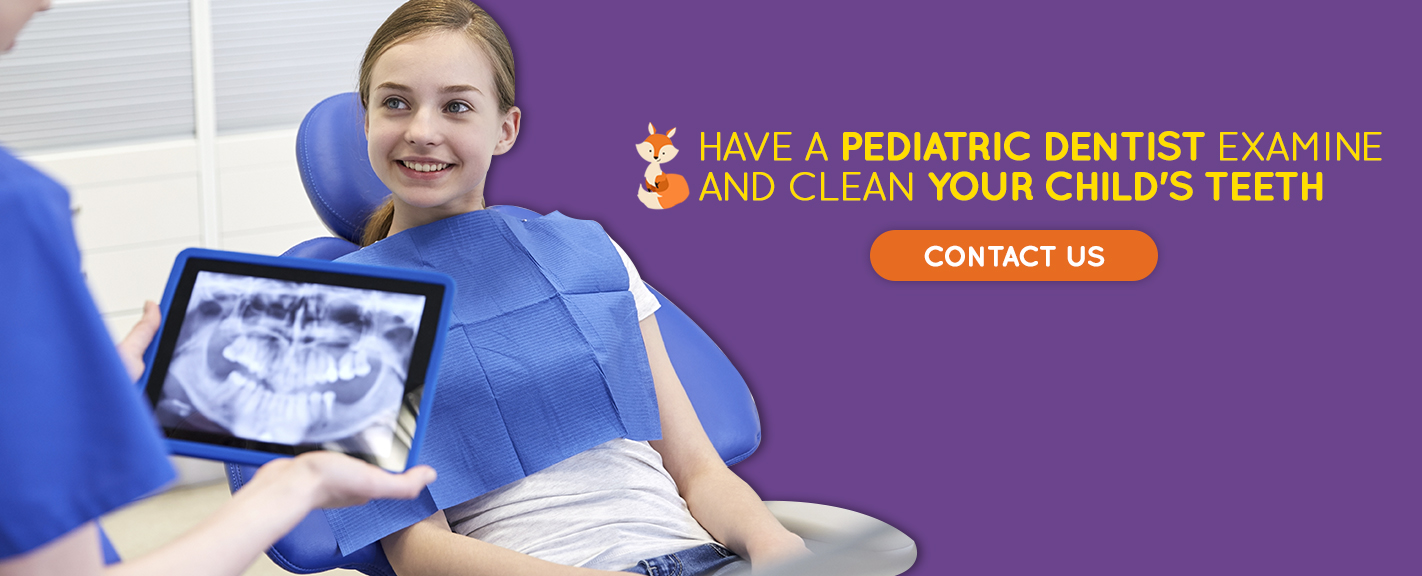
As a combined orthodontic and pediatric dentistry practice, Fox Kids Dentistry & Orthodontics wants to make it convenient to get consistent, high-quality dental care for kids of all ages. Offering cutting-edge treatments and patient-focused care, we are dedicated to helping kids of all ages maintain healthy teeth and gums. Whether you have concerns about your child’s oral health, such as bad breath, or you’re looking for a new dentist in the Portland area, we are excited for you to join us.
Call today to schedule your appointment with Fox Kids Dentistry & Orthodontics.
Schedule Your Appointment
Do you or your child need an orthodontic evaluation? Call us at 503-223-5039 to schedule your visit to our downtown Portland location!

